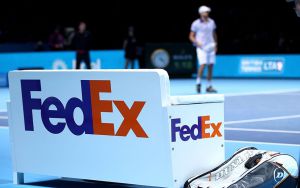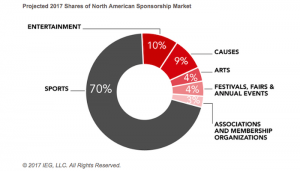
Mar 31, 2019 • 6 min read
Building Momentum: The Power of Sports Sponsorship Part II
Posted in:
Read Part I of this series – The Power of Sports Sponsorships
Building the Sponsorship Dialogue
As a recap from our last discussion on the power of sports and sports sponsorships, we identified that sports provide a unique atmosphere that allows fans to get lost in the game. Additionally, we recognized that as the passion for sports rises, the sponsorship industry grows and will continue to grow. Brands from numerous business verticals have begun to invest more frequently and heavily in partnerships with sports entities because of the return they’ve been seeing.
 Sponsorships have proven to be an effective way for companies to build brand awareness and positive brand association, bolster existing products and services, and reach consumers in one of the best ways available: when they’re watching their favorite team play!
Sponsorships have proven to be an effective way for companies to build brand awareness and positive brand association, bolster existing products and services, and reach consumers in one of the best ways available: when they’re watching their favorite team play!
As we continue to look the power of sponsorship, we will evaluate additional benefits for engaging in sponsorship, analyze best practices and existing partnerships that have generated a lot of value, and offer strategies for companies to add sponsorship as an element to their marketing mix.
Additional Benefits of Sponsorship
1. Bolster Current Marketing Initiatives
What’s the best way to maximize your return and leverage your sponsorship? By making it consistent with other elements of your current marketing mix! Sponsorship can help you build customized in-person, digital and social media campaigns that can focus on sweepstakes, contests, sales, discounts, or product/service offerings to help increase brand awareness, build loyalty, and drive a lot of traffic to locations. It is critical to use your sponsorship as an extension of current marketing tactics because it will aid in brand recognition and recall and insure that your brand is getting consistent exposure from current customers, prospects, and fans.
2. Promote New Products and Services
One of the best benefits of building a partnership with a sports team, facility, or organization is the ability to promote new products and service lines to engaged fans and potential customers. As mentioned in Part I of our series on the power of sponsorship, we commented that sponsorships provide access to passionate and emotional fans. Companies have the opportunity to utilize that access as a way of building brand awareness, driving traffic, and creating excitement for the launch of a new product or service. For example, Muscle Milk is dedicated to fueling collegiate athletes around the country, as illustrated through their relationships with 25 NCAA Division I colleges and universities throughout the United States. Through these partnerships, Muscle Milk promotes new service lines, such as the launch of protein bars in early 2017 and new flavors of their Pro Series and Organic protein shakes. By activating effectively and getting their new products in the hands of engaged fans, Muscle Milk was able to successfully integrate their protein bars and new shakes into an already successful array of product lines.
 Muscle Milk launches new protein shake flavors through collegiate partnerships!
Muscle Milk launches new protein shake flavors through collegiate partnerships!
3. Build Long-Term Relationships
Any individual with experience in the sponsorship industry, sports or otherwise, will tell you that seeing immediate return on investment from a sponsorship is quite rare. It takes time (we’re talking multiple seasons or even years) to be able to fully evaluate the effectiveness of a sponsorship. Steve Pacheco, the Director of Sponsorship Marketing for FedEx, acknowledges how quickly things move and that it usually takes two years at least before seeing a payoff. FedEx has demonstrated their commitment to sports sponsorships on a global scale through multi-year partnerships with UEFA Soccer and the ATP World Tennis Tour. When deciding on which properties you’d like to align with, it is important to plan on building a long-term relationship that will be beneficial for both parties rather than a one-time investment that won’t necessarily meet the goals and objectives for either party

The FedEx sponsorship team preaches on the importance of long-term relationships.
It Only Works if It Aligns
The above dialogue has given you some insight into the ever-growing realm of sports sponsorships and how much the industry has transformed into an effective marketing channel. However, in order to bring a sponsorship to life, it has to be managed effectively and must be a two-way street between the sports franchise or property and the sponsor. And most importantly, keep it consistent with your other marketing channels, as that will guarantee a more lucrative and worthwhile return on investment.
It is easy to see how sports are so captivating – they provide an environment where you can interact with other fans in a communal setting that is so unique. Additionally, the fan bases for the major four sports (baseball, basketball, football, and ice hockey) continue to rise each year at the local, regional, and national level. Approximately 70 percent of the US population (over 168 million people) alone categorizes themselves as a sports follower, with the three most followed sports being football, baseball, and basketball.
As fan bases continue to increase, sponsorship has grown with them. More and more companies are considering and ultimately investing in sponsorship deals at the local, regional, and national levels. Sponsorship has developed into one of the largest and most effective advertising methods available and continues to grow year after year.
 The Future Outlook
The Future Outlook
2017 marked the 34th consecutive year of the IEG Sponsorship Conference where thousands of executives from multiple brands come together to deliberate and discuss innovative ways to build successful sponsorships. To top it all off, the amount of global spending on sports sponsorships alone increases steadily by 3.5 to 4 percent annually and represents 70 percent of all spending on sponsorship in 2017.
Needless to say, the business is exploding and in many cases, sponsorship is at the centerpiece of a company’s marketing tactics. It’s time for brands to realize the opportunities available and invest in sponsorship, especially in a time where traditional channels are on the decline.
However, in order for a sponsorship, the sports franchise and sponsor must work collectively to achieve mutual goals. Sponsorship can be one of the most powerful ways to reach your target customers if approached the right way. Be sure to review your goals of a sponsorship and to see if the alignment is there – and always be sure to evaluate.
